Chris Baty's Blog, page 146
March 25, 2016
Writer’s Kit: Why Writing From Your #OwnVoice is Crucial

We’re getting ready for Camp NaNoWriMo this April! What’s in your writer’s toolkit? Today, Katherine Cho, NaNoWriMo participant and writer, tells us why your own voice is an essential part of your writer kit:
Even if you’re writing an Epic High Fantasy, you’re probably including a piece of yourself in your characters and story. It could be a hometown setting, a favorite song, or just the color of the main character’s hair. So, when the hashtag #OwnVoices came up I was intrigued. Aren’t we always writing in our own voices? I discovered, though, that it meant more than that: it was meant to support authors writing about their own diversity.
I never used to include some of the things I saw as “my family only” in my writing: how my parents ate kimchi with pizza, that Spam was a regular food group in my house, or that my grandmother would speak Korean to all of my aunts even though they always replied in English. It didn’t seem like a story for me to tell. After all, my Korean American experience wasn’t the tell-all-be-all of Korean American experiences. Even some of my closest cousins grew up completely differently from me.
Fast forward a few years. More people started bringing up the need for literature to represent our society in all of its diverse glory. It felt great, like change was coming. Still, I played it safe. I made my first character someone who was half-Korean and never talked about her roots. Partly because I still believed I shouldn’t be the voice for the Korean American experience. Partly because I’d have to explain what the word “halmoni” meant (grandmother) or why she called her aunt “Emo Katie” (Emo = mother’s sister).
I thought that no one would want to read a book that sounded like a cultural text book. Then I realized that there were already books like the Lord of the Rings or Game of Thrones series that have entire made-up languages and cultures, presented without explanation or apology.
I was just making excuses and letting my fear tell me that my story wasn’t worth telling. I thought that since many readers wouldn’t have lived my life they wouldn’t be interested in a story influenced by my upbringing. But, if readers can be interested in fictional orcs, why can’t they be interested in real-world cultures that have stories that could blow orcs out of the water.
In writing, we can’t have fear. Our stories will absorb that feeling and potentially be disingenuous. We need to be bold and free to write about not only what we know, but what we love. That will show through in your story. We should all be bold and write what we are into our stories. Then our books will show the diversity that exists in this world in a natural and genuine way. Your story might not be the universal story, but it’s still yours and that story deserves to be told.

Kat loves to incorporate her Korean American heritage in her writing, especially if it involves describing food. She loves to read and write MG and YA, mostly sci-fi and fantasy. When she’s not reading and writing (or blogging about reading and writing), she likes to play her favorite game, watch-all-the-Hulu-videos-before-they-expire. She loves anything that encourages nerding out, including reading, blogging, k-pop and anime. She’s been taking part in NaNoWriMo since 2013.
Top photo by Flickr user Howard Lake.
March 23, 2016
Seeds of Inspiration: Bringing Characters to Life On Your Story’s Stage
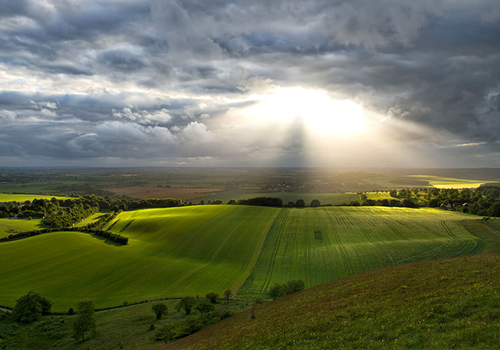
We’re getting ready for Camp NaNoWriMo this April! Every writer carries seeds of inspiration; today, Huma Kirmani, author and NaNoWriMo participant, shares the quotes that inspired her writing… and helped her see her characters as players on a grand stage:
“O thou,
Who chariotest to their dark wintry bed
The winged seeds, where they lie cold and low,
Each like a corpse within its grave, until
Thine azure sister of the spring shall blow
Her clarion o'er the dreaming earth.”— John Davies, 1570-1626, “Ode to the West Wind”>
“Before the seed there comes the thought of bloom.”
— E. B. White
I remember the passing moments of my passionate dream to be a writer; I finally took on this dream of writing in the month of November last year. I burnt the midnight oil to achieve the glory of my task and Alhamdolillah! I met the 50,000-word goal to earn the badge of writer. Now, my first Kindle ebook is available on Amazon, titled Tears of Jasmine.
My memories of writing this novel are wrapped up in many painstaking, sleepless nights, which included hours of research and mind-mapping to convey my creative ideas in the form of a book that is all about the scars of derogatory terrorism and war on the face of humanity.
As far as language is concerned, I tried to be simple with both my literal and figurative speech. I did not want to lull my readers with the usage of fascinating vocabulary; I wanted a strict focus on coherence and cohesive ideas to better ground the story in reality.
“dry seeds scatter
from my hand into the wind
one clings
as if to say there is in me
something yet to be”— Jeanne Emrich, Haiga Online
My utmost seed of inspiration for my stories and characters is a quote from William Shakespeare:
“All the world is a stage.”
Against the backdrop of war and terrorism-afflicted nations, all characters must be felt to be alive, reflecting the world in the stage you construct. I wrote with language intended to make my readers feel as if they were in the same situation as my characters, breathing in their skin.
One art of writing is to elaborate creatively so that your readers can assume themselves in your story: no matter if the situation is one of the East, even those readers who are residing in the West should be able to breathe the same air, blended into their perspective through the flow of characterization.

Huma Kirmani is from Pakistan; she loves to write prose and poetry about life in all its various genres. She is excited to share what inspires her to work for a better world, and learn what inspires others. She writes for readers of any age, culture, faith, or background who want to explore the importance of the spiritual and inspirational, and spin the wheel of life.
Top photo by Flickr user tommyscapes.
March 21, 2016
Seeds of Inspiration: 1 Foolproof Way to Generate Ideas
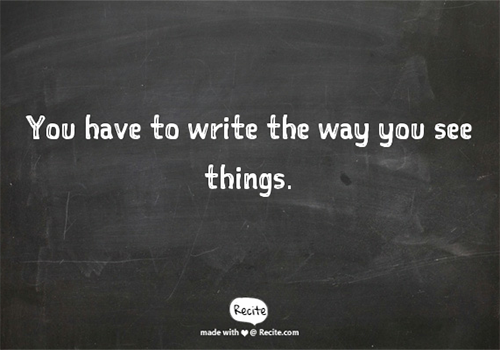
We’re getting ready for Camp NaNoWriMo this April! Every writer carries seeds of inspiration; today, Grant Faulkner, NaNoWriMo’s executive director, shares his tried and true method of breaking through writer’s block, borrowed from Ray Bradbury:
I don’t like to observe the phrase “writer’s block”—and I’m not even sure I believe such a state truly exists. I think it’s too easy to end up building an odd shrine to writer’s block—to proclaim the affliction, and then festoon one’s writing life with it by saying, “I’m blocked,” over and over again, as if waiting for magical bolts of inspiration to strike down from the sky and un-stopper it all (which only happens in the movies, right?).
My policy is that if I feel “blocked,” then I have to take responsibility for unblocking myself. I recently discovered a fun way to jump-start my imagination when one of these creative impasses occurs: Ray Bradbury’s list-making method. It’s a simple technique to generate new story ideas, go deeper into an existing story, and just have fun.
When Bradbury first became a writer, he made long lists of nouns to trigger ideas. He said that each person possesses a “fabulous mulch” of experiences in their minds, but you have to find a way to draw out the threads of memories stowed away deep in your subconscious. He did this by making lists of nouns—quickly, without over-thinking things. “Conjure the nouns, alert the secret self, taste the darkness … speak softly, and write any old word that wants to jump out of your nerves onto the page,” he wrote in Zen in the Art of Writing.
For example, here’s the list of nouns that sparked one of Bradbury’s more notable books:
THE LAKE. THE NIGHT. THE CRICKETS. THE RAVINE. THE ATTIC. THE BASEMENT. THE TRAPDOOR. THE BABY. THE CROWD. THE NIGHT TRAIN. THE FOG HORN. THE SCYTHE. THE CARNIVAL. THE CAROUSEL. THE DWARF. THE MIRROR MAZE. THE SKELETON.
This might look like a random list of words, but it offered Bradbury a window into his mind. Once he’d written a list, Bradbury began to word-associate around it by writing what he called pensées, tiny prose poems or descriptive paragraphs of approximately 200 words that helped him examine each noun and dredge his subconscious for meaning.
Concerning the list of nouns above, he said, “Glancing over the list, I discovered my old love and fright having to do with circuses and carnivals. I remembered, and then forgot, and then remembered again, how terrified I had been when my mother took me for my first ride on a merry-go-round. With the calliope screaming and the world spinning and the terrible horses leaping, I added my shrieks to the din. I did not go near the carousel again for years.”
From Bradbury’s pensée, characters emerged and carried the story forward, and he ended up returning to that terrifying carousel from his youth when he wrote the novel Something Wicked This Way Comes.
Bradbury said this exercise operated as a provocation that helped his “better stuff to surface” as he felt his way toward something “honest, hidden under the trapdoor on the top of my skull.” The exercise might look whimsical on the surface, but it is all about finding the essence of the story you want to write.
“You can’t write for other people,” said Bradbury. “You can’t write for the left or the right, this religion or that religion, or this belief or that belief. You have to write the way you see things. I tell people, make a list of ten things you hate and tear them down in a short story or poem. Make a list of ten things you love and celebrate them. When I wrote Fahrenheit 451 I hated book burners and I loved libraries. So there you are.”
And here I am, writing noun lists as preparation for Camp NaNoWriMo. Or just as warm-up before writing to help me go a little deeper, a little further into my story. I hope you’ll give it a whirl. Writer’s block be gone!

Grant Faulkner is the executive director of the nonprofit behind National Novel Writing Month. He received his B.A. from Grinnell College in English and his M.A. in Creative Writing from San Francisco State University. He has published stories and essays in The New York Times,Poets & Writers, Writer’s Digest, The Southwest Review, The Rumpus, Gargoyle, and The Berkeley Fiction Review, among dozens of others. He’s also the founder and editor of the lit journal 100 Word Story, and has published a collection of 100-word stories, Fissures.
March 18, 2016
Seeds of Inspiration: 3 Places to Find Story Treasure

We’re getting ready for Camp NaNoWriMo this April! Every writer carries seeds of inspiration; today, Aneeqah N., NaNoWriMo participant and writer, shares where you can always find inspiration:
When it comes to inspiration, a lot of writers I’ve talked to have been all, “I’m just going to wait for the perfect idea to come to me! And then I’ll write.”
Spoiler alert: that idea never comes.
If you sit around, waiting for the inspiration gods to send you something to write, then I’m sorry to inform you that your odds of finding that perfect idea are going to be really, really slim.
So if you’re stuck, here’s my advice to you: find inspiration from stories.
You’re probably thinking, “Aneeqah, I’m pretty sure they call that plagiarism? Do we need to arrest you?”, but I’m not talking about stealing from just regular stories. Think a little bigger, dear reader.
Stories are everywhere. There’s a story in every tweet, every article, every picture, every piece of news you ever happen to lay your lovely eyes upon. If you don’t see the story behind something, I urge you to look a little deeper. Look beyond what’s presented. How did those people end up in that perfect pose in that picture? What compelled an actor to send out that slightly tipsy tweet on a Tuesday evening?
Look to the people behind the stories, to how and what and why things are occurring. There’s a person behind every written word or photo you see, so delve into that. Because when it comes down to it, writers are storytellers. And those stories are based off of one key element: characters. People. And what better inspiration for those characters than true people?
Here are some tangible places to hunt for stories or new people to be inspired by:
News sources that focus on longer form content. I find the more in-depth the article, the more rich it is with voice and humanity and storytelling. I’m subscribed toInspiration is everywhere. It’s our jobs as writers to tell stories. And as much as we want to wail and complain about writer’s block or the fact that the inspiration gods have not given us any ideas, if you go out and look, you’ll find there’s a wealth of stories waiting to be discovered.
And your story is waiting to be told.
So go forth. Get out there and write.

Aneeqah is just a girl in love with young adult books. A writer, freelance editor, and writing coach, Aneeqah aims to spread as much knowledge and enthusiasm about writing and young adult books as she can. She writes about—wait for it—writing over on her blog. If you ever want to discuss books or writing or the color of the sunset, talk to her on Twitter @hianeeqah.
Top photo by Flickr user elias_daniel.
March 16, 2016
Writer’s Kit: 3 Things to Help You Reach Your Writing Goals
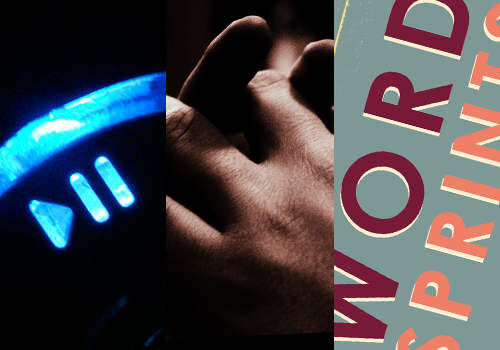
We’re getting ready for Camp NaNoWriMo this April! What’s in your writer’s toolkit? Today,
Sofia Mascaró, NaNoWriMo winner, tells us what three things helped her reach her word-count goal:
It was very close to November when I first heard about NaNoWriMo last year. I’d had several ideas that I’d wanted to write over the years, but I’d never found the inspiration and the strength to start. And just to complicate everything, November is a crazy busy month for me due to the huge number of papers and tests the college professors love to give us when the year is about to end.
So when I decided to join—“Just to try” I said to myself—I never expected to reach the goal of 50.000 words… and the funny thing is that, though I did hit that 50K, even with so many words, I only reached the halfway point of my novel, Midnight Obsessions.
Because of the NaNoWriMo challenge, I decided to finally do something that I love. There are a few things that helped me that might help you as you set out to write:
Music helps your imagination fly.I had a list of my favorite songs playing on repeat, and that gave me ideas about setting, dialogue, and feelings for my characters; some of them were included in my novel.
You can listen to anything, from classical music to the soundtrack of your favorite film (yes, I listen to soundtracks. I find them really inspiring), or start with an AC/DC song and end on Ariana Grande.
Family and friends’ support: the most important thing.I only told people who knew about my obsession with books that I was attempting NaNoWriMo and who I knew would encourage me. My mother, sister, and boyfriend actually celebrated with me on November 30 when I made it, and I could swear they were as proud of me as I was for achieving it.
Encouraging words from the people who love you is something that warms everyone’s heart, and makes you want to make it. Trust me, it worked.
Pep talks and @NaNoWordSprints: a worldwide communityLast but not least, I have to mention that the worldwide community of NaNoWriMo is, by far, the best.
During the final days of writing, I was struggling with how to continue my story, so I sent a tweet to @NaNoWordSprints (the official Twitter account for sprints, during which you try to write as many words as you can in a set period of time) asking for advice on how I could get inspired to continue writing… and I had over thirty answers from people around the world recommending things like drinking coffee, listening to my favorite songs, taking some short breaks, and so on. The help that I got from all of these people in the same situation made me cry with joy and helped me during that instance of writing block.
On another note, the pep talks from authors like Stephanie Perkins (writer of the Anna, Lola and Isla trilogy) gave very nice advice about writing that inspired me a lot when having to write my own novel.
Without these very important things I really don’t think I would’ve been able to make it. I believe it’s the feeling of writing so many words that is the biggest prize of all, not the tools or the certificate you get in the end.
I wish I had known that before I set out to write for a month: that I would be beyond happy for myself, that I would end up really tired (like super tired and wanting to sleep all the time), and that I would want to celebrate my achievement with everybody I knew… It was a great step as a writer for me, and, I think, for everyone that won for the first time last year.
Don’t despair if you don’t have any inspiration or a guideline at all: there will be always something or someone who will help you and won’t let you down. I wrote whatever came in my mind, the music helped me to establish the mood for my scenes, and the sprints made me write faster than ever, but I guess this is what a writer’s life looks like… and I truly enjoyed being part of it.

Sofia Mascaró is an Argentinian 21-year-old girl who loves History and Young Adult books. She is in her fourth year of college. She is a proud NaNoWriMo 2015 winner, bilingual, has lived in three countries (Argentina, Spain, US) and has two families (her original and her exchange American family). Her main dream is to finally graduate, publish her own book and, if possible, travel the world next to the love of her life.
Top photo composed of photos taken by Flickr users russelldavies, and .reid.
March 14, 2016
Seeds of Inspiration: Ideas Are Out There

We’re getting ready for Camp NaNoWriMo this April! Every writer carries seeds of inspiration; today, Amar Vyas, NaNoWriMo participant, author, and podcast host, shares why observation is an author’s best tool:
Someone recently said to me, “I was writing a novel when another idea struck me. Should I work on this idea or finish the novel at hand?”
My immediate answer would be to finish the novel… but what if this person ran out of ideas for the novel they’re working on? Many of us have been in that situation before. So how do we get inspirational ideas when we are feeling stuck?
My recommendation is simple. Step outside and look at the world around you. The ideas will come. And in my case, the ideas have come at the most unexpected moments. Interestingly enough, I have been traveling every time this has happened.
Four years ago, my wife and I were stuck in traffic in the New Delhi area, when I uttered the words, “Air India announces the arrival of its flight AI126 to Mumbai.” I am not sure what prompted me to say these words, but they eventually found place in my debut novel NRI: Now, Returned to India.
In another instance, I was on a flight to Bangalore and the seat next to me was empty until five minutes before the flight was about to take off. That’s when a woman walked in with a toddler. As she took her seat, she asked the stewardess for some water for her son. When the stewardess brought the water, the woman drank it herself, emptying the cup. I quietly pulled out my notepad and a pen and wrote down this incident, which then turned into a chapter in one of my forthcoming books Urban, Sophisticated.
In recent months, the local newspapers have consistently reported two types of news—how much funding was received by startups, and how the crime rate in the city has increased. I was on my way to the airport when I thought, “What if the child of a mobster wanted to launch a startup?” Yes, there is an idea for a novel brewing with this theme.
I am not a very creative person, but I do make it a habit to see what’s happening around me, and write down interesting incidents so that I do not forget them. Look around, absorb what’s going on around you, then close your eyes and create the scene in your mind. The ideas are out there.

Amar Vyas is the author of the Amol Dixit series. He is the co-founder of Kamakshi Media and the host of MyKitaab, a podcast on book publishing in India. Amar is an alumnus of the University of Illinois at Urbana Champaign in the US and IIM Ahmedabad in India. He lives in Bangalore, India, with his wife Mrunal. Amar has participated in NaNoWriMo in 2013 and 2015, and plans to participate in Camp NaNoWriMo this year.
Top photo by Flickr user AngelRays.
March 11, 2016
Seeds of Inspiration: Never Force Quit! Go Questing
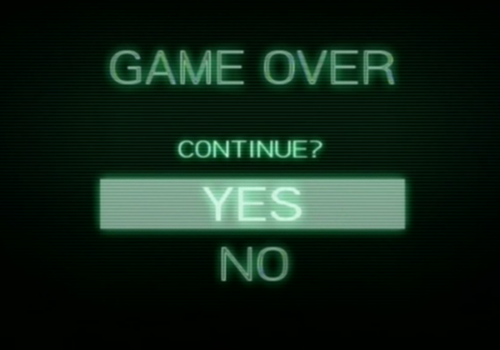
We’re getting ready for Camp NaNoWriMo this April! Every writer carries seeds of inspiration; today, Kara Bodegón, NaNoWriMo participant, writer, and visual artist, tells us why writing a novel is a series of quests:
You’ve tripped and fallen into a booby trap in the middle of conceptualizing your manuscript—it’s okay, we’ve all been there. There are those who find themselves in the ditch, then wind up hitting the force quit option to dwell there forever. And then there are writers—brave writers—who rise to find ways to climb out to freedom and run until they come across a huge cliff where, sure, they might drop to their gruesome deaths but they’ll just respawn to find a way to reach the other side.
Writing a novel is like jumping into a grand RPG adventure, where your quest is to shape a tale you’d want to read. Now, figuring out how to build these page-turning stories is all about accepting multiple side quests: gathering seeds of inspiration, fighting self-doubt, and coming out alive as a stronger writer.
When you’re stuck in that infamous ditch (call it writer’s block), you need to accept your first main quest and summon your inner seeds of inspiration.
Look for it within yourself and ask:
What am I good at? What do I love? What am I passionate about? Have I been here before?From there, you’ll be able to pull yourself out of that ditch, ready to pick out more seeds from the world around you. Grab all the interesting things you can find. Compile them in a notebook or your favorite notes app on your smartphone, and shape it into your own. The trick is to keep writing and to write what you know.
As for me, the things I know are music and live production, so I was able to come up with a pretty authentic contemporary YA novel that revolves around the music scene for NaNoWriMo 2014.
I accepted the side quest to attain more seeds of inspiration by digging into personal experiences, watching documentaries, reading autobiographies, and even conducting interviews with the pros to write the kind of book I would want to read, and guess what? My beta readers and my editor have all given my manuscript their nods of approval.
Once you’ve gathered these seeds, I dare you to plant them mentally and immerse yourself in your protagonist’s predicament. Hide away where no one can see or hear you, and act scenes out loud. Cry. Laugh. Read out dialogue with silly accents. Record all these things on your phone. Don’t be afraid to feel as you write it all down. When you catch yourself lost in the moment, you will end up finding a great story you could share with the world.
Don’t even think of hitting force quit. You can do this.

Kara Bodegón is a brooding writer/visual artist, who lives through video game consoles when she isn’t raiding metal shows. She runs a music blog called Karate Chops, where she gives a different take on writing album and concert reviews by drawing them for your viewing pleasure. Passions include music, cartoons, comics, and her quest to publish her first contemporary YA novel.
March 9, 2016
Seeds of Inspiration: Don’t Wait for Your Muse
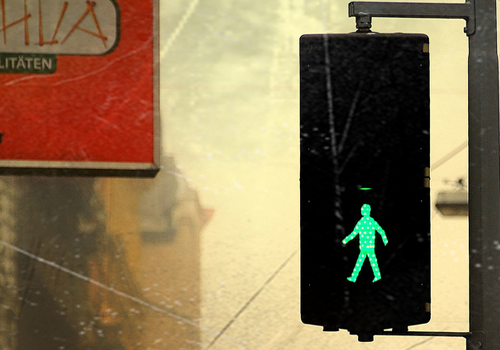
We’re getting ready for Camp NaNoWriMo this April! Every writer carries seeds of inspiration; today, Ingrid Ancona, a NaNoWriMo participant, shares her tips for chasing down inspiration:
Jack London once said, “You can’t wait for inspiration. You have to go after it with a club.” The same ambition can be applied to writing a novel. Maybe it’s your dream to be a writer, but you just can’t seem to find the inspiration to get started. Well, it’s time to rev up that V8 engine and get it done. But what if your muse is elusive?
Inspiration, like spring flowers is blooming all around you, sometimes found in the most unexpected places. You can draw inspiration from some of your favorite authors. If you are writing a romance novel, say, and you’re not sure which direction to take the character next, take a break and pick up a treasured book and read a few passages. Pay attention to how the characters interact with one another, what challenges they have to face, what obstacles are in the way or how they overcame them.
Another way to draw inspiration is from people who surround you every day; you can light a spark by having conversations with friends, your family, or even your children if you have them. My novel that I wrote during NaNoWriMo last November had twin ten-year-old evil stepsisters. I wanted their dialogue to be child-like but everything I wrote sounded like two young adults talking. I began listening to my own eight-year-old daughter speak to her friends and tweaked her conversations to fit the spoiled children in the story.
I also find that writing every single day is also useful. Just like with any other muscle in the body, exercising the brain is very important and keeping the brain cells pumped can lead to some wonderful ideas. Whether you find some quiet time in the morning before anyone else wakes up, or in bed right before you go to sleep, (which is my personal favorite time to do my writing), write something every day, even if you think it sounds like nonsense. Just do it. You can always revise your thoughts later.
Lastly, don’t overwhelm yourself. Take a break and grab another cup of coffee, take a walk, listen to some music or watch a movie. You may be surprised at where your inspiration will come from. Sometimes it might be from the most unexpected places.

Ingrid Ancona was a featured writer in the Hearts on Sleeves Romance Anthology on Wattpad for Valentine’s Day. She loves to write romance novels, romantic short stories, modern fairy tales and fanfiction. She is the single mother of an eight-year-old who at times thinks she’s a cat. Besides writing, she loves to read anything she can get her hands on, watching horror movies, and baking.
Top photo by Flickr user fra.
March 7, 2016
Writer’s Kit: 3 Things to Keep You Going When the “Shiny” Wears Off

We’re getting ready for Camp NaNoWriMo this April! What’s in your writer’s toolkit? Today, Shantea Gauthier, author and NaNoWriMo participant tells us her essential writer’s tools:
I have a confession to make. I have written more than seven rough drafts using a NaNo-style rapid-fire harsh deadline. During that time, I realized that there are three things that really keep you going once the “shiny” wears off a week into your masterpiece. Those things are, in no particular order: ergonomics, an interval timer, and rewards. Trust me.
Take Care of Your BodyNothing will bring your progress to a screeching halt and put it on indefinite hold like repetitive motion strain. Since ergonomics isn’t one-size-fits-all, you will have to accept this as an excuse to try out a variety of keyboards at your favorite stores or other people’s houses.
For less than $40 I was able to upgrade my keyboard to a model that works for me and an adjustable stool that fits my ridiculously tiny workspace. If you use a laptop, the best position to avoid strain is lying on your back with your knees up, with your head, neck, legs and arms supported by pillows. Your body is important. Treat it that way.
Mind the ClockAn interval timer is the tool that lets your creativity know when it’s time to work and your inner slacker know when it’s time to play. There are many free apps and websites that allow you to set up an interval timer, just find the one that’s right for you.
I use an eight-minute “warm-up” to grab my coffee, limber up my hands and arms, set up my music and kiss my loved ones. Then I do 48 minutes of writing and a 12-minute break, on repeat. (If you’re just starting out, try 24 and 6, and work your way up.)
When it’s time for a break- get up and move around. No exceptions, no excuses, don’t even finish that sentence. It might take a few tries to get used to it, but it’s well worth the effort.
Celebrate Your AccomplishmentsRewards are vital. You don’t need to break the budget or blow your diet doing it. Reward yourself every time you sit down with special coffee or tea. When you hit your daily goal, reward yourself with an episode of that show you want to binge on Netflix. At the halfway point, buy a book on revision or a book you’ve been wanting to read.
You can set aside $1 for every 10K words you write. If you finish ($50+), treat yourself! Keep the stakes low, the rewards reasonable, and remember that you are doing something very hard and very underrated. Celebrate your victories!

Shantea Gauthier is a novelist and a Californian; not necessarily in that order. She has a passion for dance, movement, and writing people who act like people (even if they aren’t always human). The only way she can get a first draft done is a NaNoWriMo gun-to-the-head style deadline. Find her books on Amazon. See what’s new on her Facebook page, and follow her on Twitter.
Top photo composed of photos taken by Flickr users Dzhus, numb3r, GotCredit.
March 4, 2016
Seeds of Inspiration: Write What You Want, How You Want

We’re getting ready for Camp NaNoWriMo this April! Every writer carries seeds of inspiration; today, Santana García, a NaNoWriMo participant, shares a few quotes that shaped her approach to writing:
Maya Angelou once stated that there was no greater agony than bearing an untold story inside one’s mind. So when someone decides to become a writer, magic flows through the paper, software or (clean) napkin where the words are being transcribed. But what happens when you feel like you don’t have an untold story inside you? What happens when there is no epic adventure or philosophical thought to share?
We, as aspiring authors, tend to be something else, too: readers. When struggling with what to write about, how your story will develop, who your characters will be, there’s nothing better than to simply take a step back, close your eyes, and think about your favorite books. Your favorite texts. The best adventures and plot-lines you’ve ever read. What do they all have in common? Which factors went into making you consider them your favorite books?
There are two main pieces of writing advice on which I base my entire writing (and career) philosophy.
The first one is by the genius Austin Kleon—whose books I would recommend 1000%—and it goes: “Write the book you want to read”. This quote stuck with me since the first time I read it, and has been the guideline to all of my story outlines. Nothing else matters but what you want; what do you like? How would you like the story to develop, the characters to grow, the world to be?
You novel, your story, your texts are yours; whether you decide to publish or share them, or to simply keep them in secret, they’re still yours. They’ll be part of your personality, of who you are, of what you love and what you prefer. So forget about what the world needs, what the genre tendencies are or what would sell more, and focus on what you wish existed in the reading world. Write carelessly and write with your hands. Put your heart into your story first, then, when you revise, let your eyes and brain steer. Until then, write exactly what you wish to read.
The second piece of advice is from the author Lev Grossman and is, honestly, going to gainsay absolutely everything I just said. “Don’t take anyone’s writing advice too seriously”.
This quote speaks for itself, it means, yes, you can take someone’s advice or practice their tricks but by no means are you obligated to follow any kind of template. This kind of ties in with the idea behind Kleon’s quote: no one can tell you what can and can’t do except yourself. Even your favorite author can be wrong sometimes.
Break archetypes.
Defy genres.
Basically, write whatever the hell you want, however the hell you want.

Santana García stays busy as a supervillain with a not-so-secret identity. On her downtime, you can find her drinking gallons of coffee while attempting to get her marketing degree. If anyone asks, Santana is just a nineteen-year-old, northern Mexican lost girl who writes poetry and is struggling with her first novel. She knows nothing about the bank break-in from last night.
Top photo by Flickr user DanieleCivello.
Chris Baty's Blog
- Chris Baty's profile
- 63 followers



